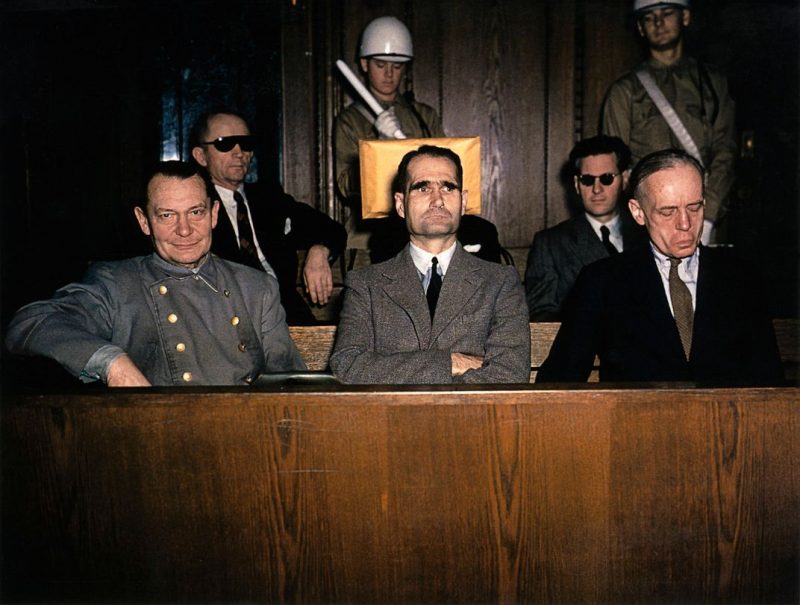Rudolf Hess was one of the most notable politicians of the National-Socialist Party and, later, Deputy Fuhrer of the Third Reich. His early life was marked by the scars of the First World War, which was an event that politically radicalized many people of his generation, including his close friend and associate, Adolf Hitler.
During the Great War, Hess enlisted in the 7th Bavarian Field Artillery Regiment. He saw battle at the Somme and Ypres and was awarded the Iron Cross, 2nd class. He rose to the rank of Corporal. Rudolf Hess participated in the Battle of Verdun, in 1916, after which he was slightly wounded. After the battle, he became an officer in the reserve and a platoon leader, stationed in Romania.
Hess expressed his ambition to join the air force, but after passing the initial exams, Germany capitulated. Having lost his family’s wealth after the war, Hess became very bitter against the new-formed Weimar Republic and joined the paramilitary group, the Freikorps, which waged an unofficial street war against the communists in the economically unstable Republic.
He was also a member of an occultist secret society called Thule, which was antisemitic and glorified the Germanic past, often taking folk stories and myths rather seriously. Through these influences, he became convinced in ‘the stab-in-the-back myth.’ It was a conspiracy theory claiming that the German Army had been capable of continuing the war and that they had lost because of a plot by the Bolsheviks and Zionist Jews who forced the government to capitulate. Later, historians completely dismissed the theory as being nothing more than a piece of racist propaganda.
In his hometown, Munich, Hess became a University student, studying geopolitics under his mentor Karl Haushofer. Haushofer was one of the founders of the Lebensraum idea – the concept which promoted German colonization of new lands, in the east. This idea became the basis of the future Nazi ideology, and its imperialistic pretensions towards the Czech Republic, Poland, and Ukraine.
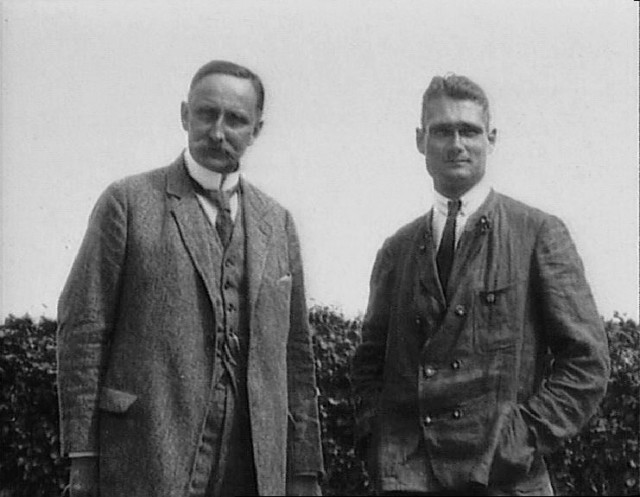
These territories were to be inhabited by German settlers as the future living space of the Greater Germanic Reich. All these ideas became possible for Hess when he heard Hitler speak on one of the NSDAP (National-Socialist German Workers Party) rallies in 1920. He and Hitler shared many views concerning ideology and Hess helped Hitler to articulate many of his concepts into written form.
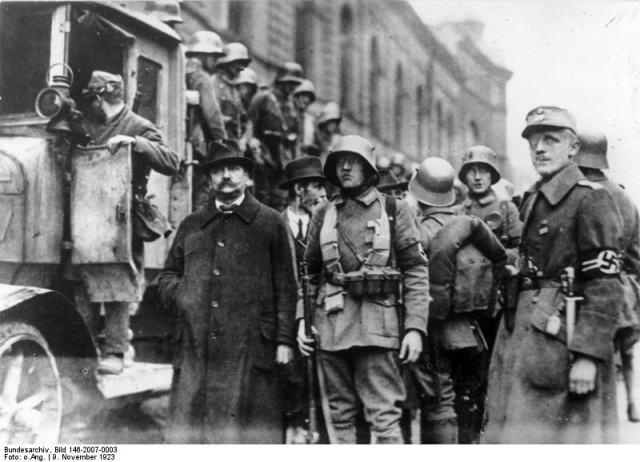
In 1921, Hess was injured when a bomb went off in an attempt on Hitler’s life in the famous Hofbrauhaus pub. The attack was credited to the German communists. Hofbrauhaus was an unofficial meeting point for the Nazi Party and, therefore, was often a target for their political enemies. In 1923, Hess joined Hitler in an attempted coup, historically known as the Beer Hall Putsch.
The coup was inspired by Mussolini’s March on Rome, which appointed him the leader of Italy in 1922. Hitler’s coup was a failure, but it enabled him to surface on the political scene of that time. After the putsch, Hitler was imprisoned, together with Rudolf Hess and other prominent Nazi figures. In prison, Hess helped Hitler write his manifesto – Mein Kampf, in which he coined many of his future goals and methods he would rely on. It included the Holocaust of Jews, Roma, mentally and physically challenged people and others who did not fit the mold of the perfect Aryan.
In 1924, both were paroled, and the ban on the Nazi Party was lifted. The Party was growing steadily, and its influence spanned across the Weimar Republic. In 1933, Hitler seized power, declared himself Fuhrer and appointed Hess as his deputy.
The Deputy Fuhrer’s duties included responsibility for departments concerning foreign policy, health, finance, education, and law. Hess usually gave the opening speech before Hitler, introducing him to the audience. He was notorious for his treatment of political enemies of the Nazi Party, sending thousands to prison and later to concentration camps.
In 1936, during the Olympics in Berlin, a British delegation visited Germany. Among the visitors was a Scottish nobleman and aviator, Douglas Douglas-Hamilton, Duke of Hamilton. During his visit, Hamilton met with Albrecht Haushofer, the son of professor Karl Haushofer, who had become Hess’s advisor on foreign affairs.
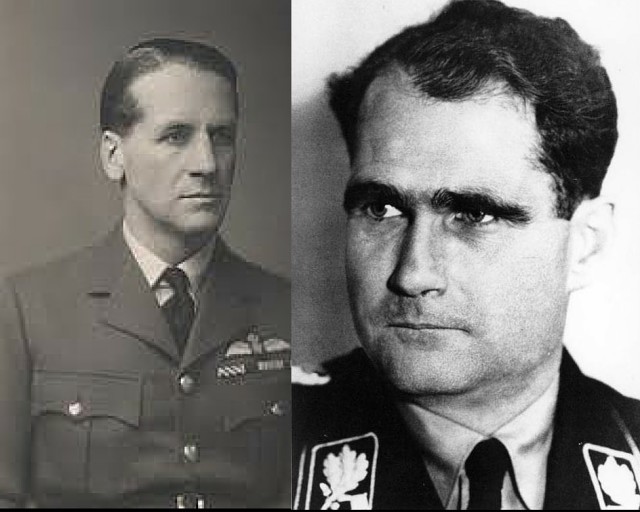
A few years after that event the war broke out, and the Nazi’s dominated Western Europe. The Germans were trying to force their last enemy, the British, to surrender. Hess lost influence during the war as his service was of better use in peacetime conditions concerning bureaucracy and administration. He was slowly being replaced by the ruthless Martin Borman who was favored by Hitler.
Rudolf Hess knew he had to regain the Fuhrer’s respect, so he devised a daring and eccentric plan which undoubtedly influenced the course of events during the war. His plan was to be revealed to Hitler via a letter he left behind – once it had been implemented.
The plan was to fly to Britain, find the Duke of Hamilton and start negotiating a secret peace treaty that would neutralize Britain from the war. That would then enable Hitler to focus all of his resources on the invasion of the Soviet Union which was scheduled for spring 1941. Hess believed that after the encounter with Haushofer, Hamilton became sympathetic towards Nazi policy.
He wanted to convince the British that it was possible to develop spheres of interest and fight against Bolshevism through a non-aggression pact. Hess wanted to achieve an agreement that would leave continental Europe to Germany, while all British colonies would be left outside the interests of the Third Reich.
Hess finished his pilot training, and on May 10, 1941, he took off in secret, hoping to avoid the British radars. He was spotted by several stations in northern England and by the Spitfires of the 72nd Squadron, RAF, patrolling the coast. His plane ran out of fuel, so he ejected while being pursued by the RAF. On landing, he injured his leg and was then captured in Eaglesham, south of Glasgow, Scotland.
He claimed, using a false name, that he was to meet the Duke of Hamilton. His statement compromised Hamilton’s political career for he was suspected of treason. It was later revealed that Hamilton had never even met Hess during his stay in Germany and his name was cleared.
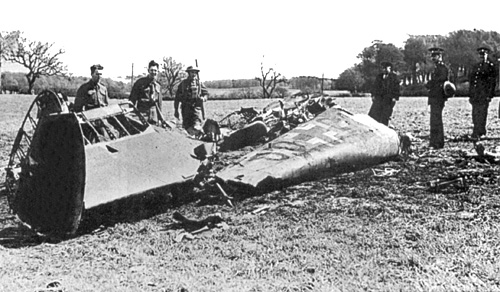
Hitler regarded Rudolf Hess’s action as treason, for he had absolutely no intention of making peace with the British. Goebbels participated in a propaganda campaign which denounced Hitler’s association with Hess. Members of Rudolf Hess’s staff were arrested. Among them were hundreds of astrologers, faith healers, and occultists who were all part of Hess’s clique, as he was deeply involved with all kinds of superstition. Martin Borman became Deputy Fuhrer, and he held that role until the end of the war.
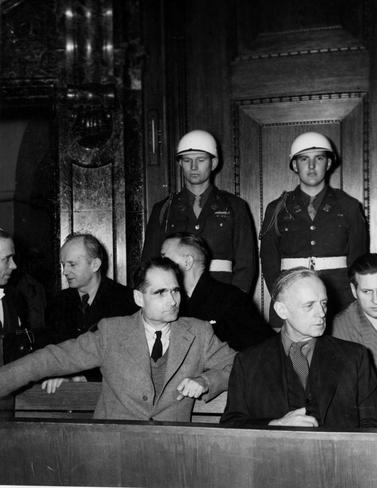
Meanwhile, Hess was in custody in Britain. He spent the rest of the war imprisoned in a mansion in Surrey where he was treated well but was forbidden to read the newspapers or listen to the radio. He was given psychiatric treatment and was diagnosed as suffering from hypochondria and paranoia.
After the war, he went on trial in Nuremberg and was sentenced to life in prison which he spent in Spandau Prison, Germany.
